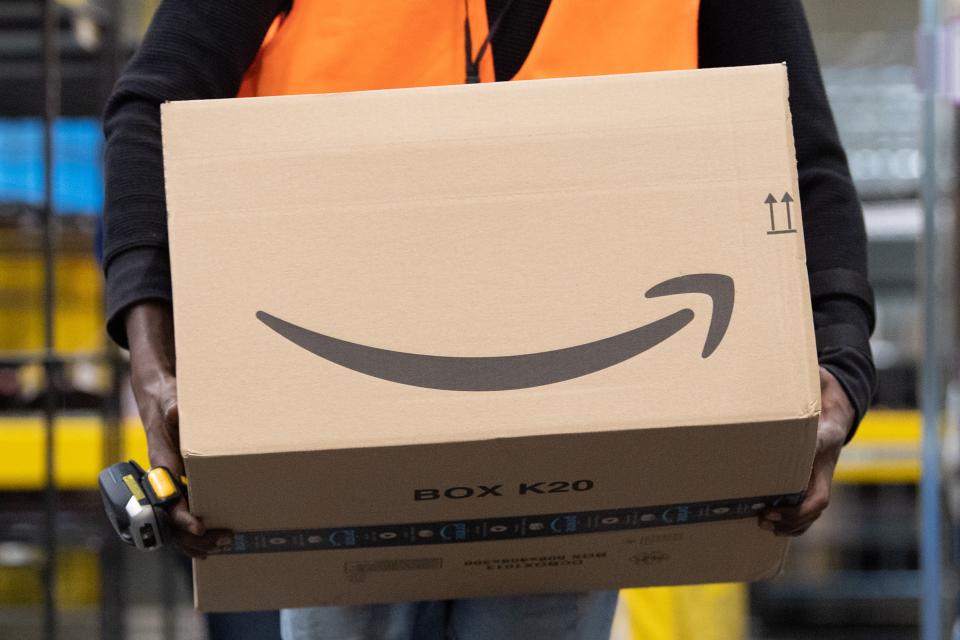The stock market’s rally is being fueled by these massive stocks
The coronavirus pandemic’s rapid spread has upended economies and tested markets around the world.
After hitting all-time highs on Feb. 19, the S&P 500 (^GSPC) plummeted into a bear market at its fastest pace in history, closing at a three-year low on Mar. 23. Since bottoming, the S&P has rallied 29% and is on pace for its first back-to-back weekly gains since the week ending February 14, before the coronavirus-related selloff began. This comes even as coronavirus cases and death tolls continue to rise around the world.
The market rally, however, has been largely fueled by one group of stocks: mega-cap tech. Microsoft (MSFT) shares have soared 30% since the bottom, while Apple (AAPL) has jumped 25%, Amazon (AMZN) has risen 24%, Facebook (FB) is up 21% and Alphabet (GOOG, GOOGL) surged 20%.
In a note to clients on Friday, Bank of America strategist observed that the S&P is “more concentrated in the 5 largest stocks than ever” as a result of the outperformance of these names.
“One of the important things to remember is a significant portion of these market moves are driven by ETFs and index funds,” Seeyond’s Head of Client Portfolio Management Alex Piré said Friday in an interview with Yahoo Finance. “What obviously happens with those is they tend to be tilted to larger caps and mega-cap securities. Those are typically weighted indexes, so that does sort of create this inflection on these types of securities.”

Within the S&P 500 index, five of the top six holdings consist of Microsoft, Apple, Amazon, Facebook and Alphabet. Those five large-cap tech stocks account for roughly 20% of the S&P 500’s total value, and that number has been growing amid the COVID-19 crisis.
“A key explanation is that, unlike in the other indices, half of the 10 largest firms in the S&P 500 are IT or consumer discretionary giants,” Capital Economics wrote in a note Thursday. “They have benefited, at least in relative terms, from measures taken to control the spread of the virus. We think that may continue to stand the S&P 500 in good stead for a while, even after those measures are eased.”
Small-cap versus large-cap
On the other hand, small-cap stocks haven’t fared as well as their large cap counterparts during the crisis. Just in the past week alone, the ETF tracking small caps, IWM, sank 2%, while the broader market rose 2% and the tech ETF, XLK, jumped 4%. From their highs, the IWM is down a whopping 29%. Meanwhile, the S&P fell 16% and the XLK sits about 14% from its all-time high.
Underperformance in small caps is likely to persist, according to Piré.
“Now, what we're seeing I think in small caps is still very much the thought process that, ‘look, there is more embedded [coronavirus] risk.’ The securities tend to be more sensitive to the economy, and they may have more volatility embedded,” Piré said.
Equity markets may have surged this week, but the economic data is telling a very different story. March retail sales data showed a record plunge in consumer spending during the month, while initial jobless claims topped five million for the third consecutive week. Manufacturing data has been dismal, and sentiment is getting crushed.
Nevertheless, there is still hope that the economy will be able to bounce back once the virus is contained and a vaccine will be developed soon. Even as the large-cap tech stocks have been able to outperform in an environment when consumer spending has mostly come to a halt, names like Amazon and Apple are still heavily exposed to the consumer, and thus, investors need to stay cautious, Piré argued.
“I think that it helps a lot of these big cap and tech names that have those high beta components embedded, but I would be cautious about the future. We don't have a cure yet. We have hope. We don't have a vaccine yet. We have hope there as well,” Piré said. “Unless we have a cure tomorrow and we have testing tomorrow, this ‘V-shape’ recovery is probably not coming back.”
—
Heidi Chung is a reporter at Yahoo Finance. Follow her on Twitter: @heidi_chung.
More from Heidi:
Jobless claims: Another 5.245 million Americans file for unemployment benefits
Retail sales see record plunge in March, key consumer categories crash
Find live stock market quotes and the latest business and finance news
Follow Yahoo Finance on Twitter, Facebook, Instagram, Flipboard, LinkedIn, and reddit.

 money
money 
